#fiji climate change impacts
Text










🇩🇰 Crown Princess Mary of Denmark
Tuesday, April 25, 2023
“Her Royal Highness Crown Princess Mary of Denmark and the United Nations Under-Secretary General and UNFPA Executive Director Dr. Natalia Kanem visited Nabavatu villagers in Dreketi, today.
While the Fiji Government and other organisations are working collectively to relocate them to a new village site, HRH Princess Mary said she was amazed at the level of resilience, unity and communal spirit displayed by the villagers to be able to look out for each other.
“It is difficult to imagine the fear that you have experienced in this part of the world, the despair in the aftermath, the energy and strength that it takes to rebuild and unite again,” HRH Crown Princess Mary of Denmark said.
“Since being here in Fiji, the whole delegation has felt an extreme resilience, a strong belief system, a power of human spirit and a sense of community to look after each other, to be there for each other.”
Crown Princess Mary assured the villagers that they were not alone; “Us being here is a sign that we are also with you, that we are concerned of what is happening in the world and the impact of climate change and how it is not just affecting our environment, but affecting us socially and economically as well.”
The villagers were presented with basic food items, hygiene packs for women, tarpaulins and other materials that would assist them with their daily lives, by the visiting delegation.
Accompanying the Her Royal Highness was the Danish Minister for Development Cooperation and Global Climate Policy, Dan Jørgensen, and the Assistant Minister for Rural and Maritime Development Hon. Jovesa Vocea.
Crown Princess Mary also visited Dreketi Central College, where she was accorded a guard of honour by the students.”
20 notes
·
View notes
Text
Blog Post 2
Prompt: Describe your ideal role of environmental interpreter. What might it entail? Where might it be? What skills might you need?
In a world that continuously faces unpredicted environmental changes and challenges, my ideal role as an environmental interpreter would be to study, observe and educate scenarios surrounding climate change in hopes of a better understanding of our environment to kickstart change. Ideally, I would love to travel all over and study different species/areas to better understand how these species react to changes in their environment and why. Having a deeper understanding of this as an environmental interpreter would allow me to spread environmental awareness worldwide. This would help others understand how our actions impact the environment and in what specific ways as well as how we can prevent and start to eliminate climate change. I feel as though reiterating scientific information to the general public in a way that can be easily understood by many is incredibly important when striving for environmental change. Scientific communication can often discourage people from extending their scenitifc and environmental knowledge simply because the language or concepts can be difficult to understand. Not only is simplifying concepts and language to terms that are generally understood important but relating it to the lives of others and how climate change has a snowball effect on us as humans gives individuals incentive to become more environmentally aware.
There are multiple different steps and skills needed to make this possible, one major one would be finding a research team or company to be a part of. Since climate change reseach involves various fields like climatology, economics, ecology and other sorts of social science it is crucial to have people from different expertise working together to ensure all aspects of climate change are evaluated. Personally, I would ideally like to take on more of the ecology side of climate change like studying different species and how increasing climate alters behaviorism and what that can mean for the species in the future. I would also love to design my own research and collect and analyze data. This would outline how our data would be collected, interpreted and what questions we are looking to find an answer to for said experiment/observation. From the research I would conduct I would then collaborate with policymakers on adaptation and mitigation strategies based on the research findings. When thinking about where I would like to carry out my ideal role as an environmental interpreter, there are many places in the world that come to mind. One part of me feels like I would enjoy carrying out this task in places that experience the largest hit in terms of climate change such as, The Great Barrier Reef, Fiji, Venice, Chad, etc, but another part of me would love to do work on the coast of something like Nova Scotia or British Columbia. As I said before I would like to work with the ecology side of things, but when being specific I am still unsure if my focus would be on marine species or terrestrial species but, I have always been fascinated by marine species and would love to conduct water study experiments. When thinking of some of the skills that would be needed to make this successful I would need to do things such as use my knowledge to define research objectives and questions as well as funding. Another important factor would be to access data and resources as climate change research heavily relies on existing datasets and climate models as well as the use of advanced technology like supercomputers or silmulation. Another important factor would be long-term monitoring plans as climate change is a lone-term phenomenon and ongoing research spanning for long periods of time is essential.
2 notes
·
View notes
Text
At the UN conference, attended by global leaders and heads of state, the heads of small island developing states such as Palau, Fiji and Tonga spoke of the devastating impact on their countries from increasing typhoons and sea level rise. The minister for climate change in Vanuatu, Silas Bule Melve, said the climate crisis was the single biggest threat” to the country’s efforts to expand its blue economy.
On Monday, Guterres declared the world was in the middle of an “ocean emergency” and condemned the “egoism” of some countries that were hampering efforts to reach a long-awaited treaty to protect the world’s oceans.
A longstanding promise, made in 2009 and brought to the fore at Cop26, from rich countries to provide £100bn a year in climate finance to the developing world has not yet been delivered.
Although this finance was a small part of what is needed, the failure to honour the promise of providing it, year after year, has added to the division between rich and poor countries, Guterres said. It “probably won’t happen in 2022”, he added. “This makes developing countries feel that there is indeed not a strong commitment of solidarity. Small island developing states feel it with particular intensity.
“There is a risk of the next Cop to be negatively impacted by this frustration of developing countries and lack of confidence and trust in the seriousness of the support of the developed world. And this would be tragic because we really need to mobilise everybody. We need everybody committed if we want to keep 1.5C alive.”
2 notes
·
View notes
Text
CSR POLICY MAKING ROUND
In today's socially conscious landscape, a company's true success transcends mere profit margins and headcount numbers. Instead, the benchmark of excellence lies in the public's trust and the tangible positive impact on society. In this regard, Corporate Social Responsibility (CSR) has emerged as a powerful tool, acting as a societal report card for businesses.
Think of CSR as a compass, guiding companies towards social accountability to stakeholders and the public alike. It fosters a conscious awareness of their overall impact - economic, social, and environmental. Leading the charge are companies like Patagonia, renowned for its environmental activism and commitment to sustainability, and Tesla, whose electric vehicles revolutionise the transportation industry while combating climate change. These organisations, alongside countless others, understand that profit and purpose can coexist, cultivating trust and admiration amongst investors, employees, and customers.
However, the corporate landscape isn't without its blemishes. Recent headlines expose the pitfalls of prioritising profit over responsibility. Facebook, now rebranded as Meta, faces fierce criticism for its handling of user data and the spread of misinformation. Similarly, Uber's labour practices and Amazon's treatment of warehouse workers raise ethical concerns. These cautionary tales underscore the importance of genuine CSR, moving beyond performative gestures and embracing a holistic commitment to positive change.
Looking ahead, the conversation around CSR continues to evolve. The growing influence of ESG (Environmental, Social, and Governance) investing emphasises the financial benefits of responsible practices. Consumers are increasingly wielding their purchasing power to support companies aligned with their values. Meanwhile, regulatory bodies are implementing stricter measures to ensure corporate accountability.
The true measure of a successful organisation lies not just in its bottom line, but in the positive impact it creates on the world around it. CSR, when embraced authentically, serves as a powerful tool for building trust, fostering innovation, and driving a more sustainable future. As stakeholders hold companies accountable and the bar for responsible business practices continues to rise, organisations that prioritise genuine impact will undoubtedly be the ones shaping a brighter tomorrow.
TASK IN HAND
You are required to make a PPT (of not more than 5 slides) consisting of-
Defence strategies
5 new CSR policies for the company
Creatives
Any other extra deliverable
Given cases:
1. Volkswagen's "Clean Diesel" Scandal: VW's emissions scandal, where they deliberately cheated on emissions tests for their diesel vehicles, highlights the potential for greenwashing and CSR initiatives being used to mask unethical practices. This case damaged their brand reputation and resulted in billions in fines and lawsuits.
2. Nestlé's Water Privatisation Controversy: Nestlé's aggressive water extraction practices in developing countries, particularly in Pakistan, have drawn criticism and accusations of exploiting local resources. This case illustrates the importance of considering community impact and potential downsides of CSR initiatives.
3. PepsiCo's "Aquafina" and the Fiji Water Debacle: PepsiCo's marketing of Aquafina as "pure" was challenged when the source water was found to be filtered tap water. Similarly, their bottling of Fiji Water was criticised for depleting local resources and contributing to environmental damage. These cases show how misleading marketing can undermine the credibility of CSR claims.
4. BP's Oil Spill and Greenwashing Efforts: The Deepwater Horizon oil spill in 2010 remains one of the worst environmental disasters in history. BP's subsequent greenwashing campaigns and perceived lack of responsibility for the spill's long-term impact on the Gulf Coast communities eroded public trust.
5. Facebook's Libra Controversy: Facebook's attempt to launch its own cryptocurrency, Libra, faced scrutiny for potential privacy concerns and its impact on financial ecosystems. This case highlights the need for ethical considerations beyond traditional environmental or social concerns in CSR initiatives.
6.Walmart's Ethical Labour Issues: Walmart has been criticised for its labour practices in its supply chain, with allegations of poor working conditions, low wages, and union busting. These issues have damaged the company's reputation and led to boycotts by consumers and activists.
7.H&M's Cultural Appropriation Accusations: H&M has been accused of cultural appropriation on multiple occasions, most notably in 2018 when they released an ad featuring a black child wearing a hoodie that read "Coolest Monkey in the Jungle." The ad was widely condemned as racist and insensitive, and it forced H&M to pull the ad and apologise.
8.Shell's Environmental Impact: Shell has been criticised for its environmental impact, particularly its role in climate change. The company has been accused of downplaying the risks of climate change and investing in fossil fuels that contribute to the problem. In 2019, a Dutch court ordered Shell to reduce its carbon emissions by 45% by 2030, setting a precedent for other oil and gas companies.
1 note
·
View note
Text
Predicting specific events that will happen to a country by a certain year is challenging and often uncertain. However, based on current trends and projections, here are some possibilities for Fiji by 2050:
1. Climate change impact: Fiji is highly vulnerable to the impacts of climate change, including rising sea levels, increased intensity of storms, and changing weather patterns. By 2050, these effects could be more pronounced, leading to coastal erosion, flooding, and damage to infrastructure. The government will likely continue to invest in resilience measures to protect vulnerable areas and communities.
2. Tourism and economy: Fiji heavily relies on tourism as a major source of income. By 2050, tourism is expected to continue growing, attracting visitors from around the world. However, changing travel patterns, evolving preferences, and competition from other destinations may require Fiji to adapt its tourism strategies to remain competitive.
3. Economic diversification: In addition to tourism, Fiji may continue its efforts to diversify its economy. This could involve expanding sectors such as agriculture, fisheries, manufacturing, and renewable energy. The government might implement policies and incentives to encourage investments in these sectors.
4. Demographic changes: Fiji's population is projected to continue growing, which could lead to increased urbanization and potential challenges related to housing, infrastructure, and public services. The government may need to address these issues by implementing effective urban planning and development strategies.
5. Regional cooperation and development: Fiji plays a significant role in the Pacific region, and by 2050, it may continue to enhance its relationships with neighboring countries and regional organizations. Collaboration on issues like climate change, trade, and security could be prioritized to ensure stability and development in the region.
Please note that these are speculative possibilities, and actual events may differ based on various factors such as global trends, governmental policies, and socio-economic changes.
0 notes
Text
Fiji faces various challenges, including climate change impacts, natural disasters, and economic disparities. To address these issues, implementing sustainable development initiatives is crucial. Enhancing resilience to climate change, investing in disaster preparedness and response, and promoting inclusive economic policies can contribute to a more stable and equitable future for Fiji.
There are many more changes that can make positive changes, such as younger generations' involvement and international collaborations.
0 notes
Photo

🌍 Econometric Modeling of Sustainable Hotels Worldwide: Unleashing the Power of Green Hospitality 🌱🏨🌞 🔍 Sustainability in the Global Hotel Industry: Leading the Way to a Greener Future 🌿🌍💼 "Sustainable tourism is not just a trend; it's the pathway to a thriving planet and prosperous businesses." - Hotel Investor X Are you ready to explore a world where green hospitality meets economic prosperity? In this exciting edition of the Sustainable Investing Digest, we delve into the revolutionary world of sustainable hotels. 🏨🌱 📈 Economic Statistics About Sustainable Hotels The research suggests that countries with high levels of ecological expansion are more likely to publish sustainability reports following GRI guidelines. The correlation between sustainability practices and economic growth is unmistakable. Tourism has a significant impact on economic growth, capital investment, agriculture and energy development, and poverty reduction in developing economies like Pakistan. Embracing eco-friendly technologies can enhance tourism business productivity, tourist satisfaction, and repeat visits, paving the way for inclusive and resilient economies. 📊📉💰 🌍 The Global Impact of Sustainable Tourism As tourism continues to drive economic growth, it also comes with environmental responsibilities. Environmental impact and logistical operations play a role in shaping the industry. The rise of terrorism has affected destination choices, while climate change poses both vulnerability and resilience effects on tourism and the economy. We must recognize the positive effects of tourism on economic growth in various regions, from Fiji to Beijing, and understand its potential as an engine for economic recovery. 🌊🌴☀️ 📊 Econometrics Unleash the Power of Sustainability With the power of econometrics, we can understand the intricate relationship between sustainable practices and economic growth. Governance quality, environmental performance, and social performance play pivotal roles in promoting sustainability reporting in the global tourism industry. By analyzing vast datasets and employing dynamic panel GMM models, we uncover the key drivers of sustainable hotels worldwide. The findings confirm the importance of sustainability in this industry and highlight the need for robust regulatory support. 📊🧠💼 🏨 The Pathway to a Greener Future To achieve a truly sustainable hotel industry, leading hotel chains must go beyond mere efficiency gains and adopt a strong model of sustainability. By extending their sustainability reporting and introducing external assurance procedures, they can become pioneers in promoting sustainability within the sector. The call for sustainable tourism development resonates not only as a business opportunity but as a chance to protect our planet and uplift communities. 🏞️🌈👥 📢 Call to Action: Subscribe to the Sustainable Investing Digest Are you ready to be at the forefront of sustainable hospitality? Subscribe to the Sustainable Investing Digest today by clicking this link https://bit.ly/44N6o2i and be part of a global movement driving positive change in the hotel and resort industry. By subscribing, you gain access to valuable insights, consulting services, and training opportunities for hotel and resort developers, creating a world of environmentally responsible and climate-resilient tourism. Together, we can shape a brighter and greener future for generations to come. 🌟📥🤝 Join the movement, #GreenHospitalityRevolution 🌱🏨 Let's build a world where sustainability and economic prosperity go hand in hand! 💚🌍💼 Note: The Sustainable Investing Digest plans to offer consulting services to hotel and resort developers, train their teams on sustainability and climate resilience, and produce training videos and webinars placed in their virtual library. 🌐📈🎬
0 notes
Text
Italy's Leadership in Climate Change Solutions Unveiled
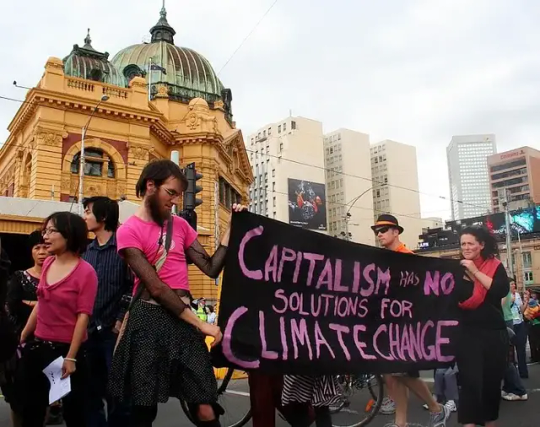
A Crucial Role of Oceans and Seas
In the intricate tapestry of global ecosystems, oceans and seas have emerged as pivotal players, contributing significantly to food security, climate change mitigation, and nourishing an expanding portion of the world's population.
Italy, with its extensive coastline of nearly 8,000 km and over 800 small islands, stands as a testament to the vital connection between nations and the seas.
Small Island States Face Dual Threats
Amidst the escalating realities of global warming and the relentless onslaught of natural calamities, the profound impact on daily life is becoming increasingly apparent. For nations that share Italy's deep reliance on the ocean, these challenges are even more pronounced.
Small island states, colloquially known as Small Islands Developing States (SIDS), find themselves at the crossroads of food dependence, escalating environmental degradation, and the looming menace of rising sea levels.
Forging a Comprehensive Path Forward
To navigate this complex web of interrelated challenges, Italy is pioneering an innovative approach. Recognizing the urgency, Italy is merging conventional diplomacy with novel territorial diplomacy, fostering dialogue between Italian cities and small island states.
This holistic strategy envisions a 360-degree solution, aimed at tackling the intricate web of issues collectively.
Italian Initiative Unites Nations
In a remarkable display of international cooperation, the second FAO summit held in Rome convened an assembly of developing countries from small island states. Distinguished leaders including the Prime Minister of Samoa and ministers from Fiji, Guyana, Seychelles, Palau, Kiribati, Papua New Guinea, and Comoros engaged in a symphony of discourse.
This consortium of voices also welcomed insights from Italian port cities - Trieste, Ancona, and Palermo - renowned for their adeptness in sustainable marine resource management.
Italy's Multi-Faceted Commitment to Climate Change Solutions
Evidencing a steadfast commitment, Italy, subsequent to a series of deliberations with Small Island representatives in New York, has embraced an intensified partnership.
The Italian government has channeled approximately 90 million Euros to fund initiatives in the Pacific and Caribbean islands, spanning environmental conservation, climate change resilience, and risk mitigation.
Empowering the youth, scholarships have been extended to the Alliance of Small Island States, nurturing expertise in these paramount subjects.
Pioneering Technological Advancements
Innovation stands as a hallmark of Italy's approach. Initiatives encompass the deployment of aerial remote sensing systems, a pioneering venture poised to develop predictive models for extreme weather phenomena.
This cutting-edge technology also offers invaluable insights into the regions most susceptible to climate-induced transformations.
Italy's Vision for a Sustainable Future
The journey towards a symbiotic future between Italy and small island states marches forward with unwavering zeal.
A monumental event looms on the horizon - the fourth UN Conference for Small Island Developing States, hosted by Antigua and Barbuda.
Italy, playing a pivotal role in the organizing committee based in New York, is poised to steer this momentous occasion towards fruitful outcomes.
Nurturing Partnerships for a Sustainable Tomorrow
With an ardent focus on collaboration, Italy seeks to meld the capabilities of its territories with the needs of its partners. Through synergistic endeavors spanning commerce, academia, science, and culture, a vibrant network emerges, driven by the shared ethos of sustainability, inclusivity, and innovation.
This concerted effort stands as a testament to Italy's unwavering commitment to placing human rights at the nucleus of its initiatives.
Italian Diplomacy: A Tapestry Woven by Territories
The global stage witnesses Italy's bold and compassionate foreign policy in action, rooted in a profound synergy between the nation's government and its territories. A remarkable blend of "know-how" and adept problem-solving nurtured in the heart of Italian cities propels this visionary endeavor.
A Holistic Approach to Global Challenges
As the world sets its sights on the forthcoming Cop28 in Dubai, Italy's approach resonates deeply. The focus on people and territories, a thread woven into the very fabric of Italy's participation, is also evident in its bid for Expo2030.
This unwavering dedication underscores the belief that only by uniting around human welfare and nurturing the landscapes we inhabit can we hope to surmount the monumental challenges that define our era.
Sources: THX News & Ministry of Foreign Affairs.
Read the full article
#Climatechangesolutions#environmentalresilience#FutureSustainability#GlobalDiplomacy#ItalyCollaboration#OceanicEcosystems#RisingSeaLevels#SmallIslandStates#Sustainabledevelopment#WorldwidePartnerships
0 notes
Text
FHTA Tourism Talanoa: Agriculture - Fiji's Next Economic Powerhouse
FHTA, 13 July 2023 – Well, why not? We do after all, have acres and acres of land lying idle.In the face of adversity, farming communities across Fiji have consistently demonstrated remarkable resilience despite the impacts of climate change which Pacific Island Countries do very little to contribute to but must bear the brunt of in any event.Following devastating tropical cyclones or floods,…

View On WordPress
1 note
·
View note
Text
China's Recovery to Fuel East Asian Growth Boom

Official Announcement by World Bank...
Growth in developing East Asia and the Pacific is forecast to accelerate in 2023 as China’s economy reopens, while the pace of growth in most of the economies in the rest of the region is anticipated to ease after a strong rebound last year, a World Bank report said on Thursday.
Economic performance across the region, while robust, could be held back this year by slowing global growth, elevated commodity prices, and tightening financial conditions in response to persistent inflation, according to the World Bank’s East Asia and Pacific April 2023 Economic Update.
Growth in developing East Asia and the Pacific is forecast to accelerate to 5.1% in 2023 from 3.5% in 2022, as China’s reopening helps the economy rebound to a 5.1% pace from 3% last year.
Growth in the region outside China is anticipated to moderate to 4.9% from the robust post-COVID-19 rebound of 5.8% in 2022, as inflation and elevated household debt in some countries weigh on consumption.
World Bank East Asia and Pacific Vice President Manuela V. Ferro said,
“Most major economies of East Asia and the Pacific have come through the difficulties of the pandemic but must now navigate a changed global landscape.”
“To regain momentum, there is work left to do to boost innovation, productivity, and to set the foundations for a greener recovery.”
Among the larger economies of the region, most, including Indonesia, the Philippines, and Vietnam, are anticipated to grow more modestly in 2023 than in 2022. Most Pacific Island countries are forecast to grow faster in 2023, but Fiji’s exceptionally strong economic pace in 2022 is likely to moderate.
Most countries in the EAP region have seen two decades of higher and more stable growth than economies in other regions. The result has been a striking decline in poverty and, in the last decade, also a decline in inequality.
However, the catch-up to the per capita income levels of advanced economies has stalled in recent years as productivity growth and the pace of structural reforms has slowed. Addressing the significant “reform gap,” especially in services, could magnify the impact of the digital revolution and boost productivity in sectors from retail and finance to education and health.
The economies of the region must also cope with three important challenges as policymakers act to sustain and accelerate economic growth in the aftermath of COVID-19. Rising tensions between major trading partners will affect trade, investment, and technology flows across the region.
The rapid aging of the major economies of East and Southeast Asia heralds a new set of challenges and risks with implications for economic growth, fiscal balances, and health.
Finally, the region is particularly exposed to climate risks, in part due to the high density of population and economic activity along its coasts.
World Bank East Asia and Pacific Chief Economist Aaditya Mattoo said,
“De-globalization, aging, and climate change are casting a shadow over the growth prospects of a region that has thrived through trade and is growing old fast.”
“However, promoting trade, addressing population dynamics, and enhancing climate resilience could strengthen growth.”
Sources: THX News & World Bank.
Read the full article
#ASEANEconomics#ASIANEconomics#China'sRecovery#ChinasGrowth#ChineseGrowth#EastAsianGrowthBoom#WorldBank
0 notes
Text
RNZ Pacific 1308 10 Mar 2023
7390Khz 1259 10 MAR 2023 - RNZ PACIFIC (NEW ZEALAND) in ENGLISH from RANGITAIKI. SINPO = 45344. English, s/on w/bellbird int. until pips and news @1300z anchored by Susana Lei'ataua. Sports. @1308z "Pacific Waves" anchored by Koroi Hawkins. Fiji's former prime minister Frank Bainimarama and suspended police chief Sitiveni Qiliho have been granted bail. Both men have pleaded not guilty to one count each of abuse of office. Magistrate Seini Puamau has set bail at $FJ10,000 (over $NZ7,000), according to local media reports. Bainimarama and Qiliho have also been ordered not to leave the country and to reside at a permanent address. The incumbent FSM President David Panuelo lost his seat in Congress during the general election on Tuesday. In a leaked letter to the FSM leadership, viewed by RNZ Pacific, Panuelo said he accepted the election loss. "I have publicly committed to a peaceful transition of power," he said. A national election office representative told RNZ Pacific the official results are expected to be finalised later on Friday before it is publicly announced. The Australian Human Rights Law Centre says toxic politics was behind Canberra's refusal to endorse legislation to end offshore detention. The Migration Amendment [Evacuation to Safety] Bill was introduced by Greens Senator Nick McKim but tossed out by Labor and the Liberal opposition. Three children in Tonga who died from viral pneumonia caused by Influenza B were aged 1, 3 and 13. CEO of the Ministry of Health, Dr Siale 'Akau'ola, told Matangi Tonga the outbreak of influenza-like illnesses has been going on in Tonga for the last eight-to-nine weeks. The number of cases for last week, week nine of the outbreak, appeared to show an 18-percent reduction, but he warns these numbers are likely to be under-estimated. Efforts are being made to ensure Pacific nations can cope with changing tuna migration patterns in the region. Tuna migrations are already happening due to climate change and will become more pronounced over the next 30 to 40 years, bringing multi-million dollar impacts to Pacific economies. The Indonesian Military has turned down New Zealand’s offer of assistance in an operation to release the New Zealander pilot who has been held hostage by an armed Papuan rebel group in Nduga regency, Papua Highlands, for about a month. Members of the Post Primary Teachers Association and the Educational Institute said the Education Ministry's offer of a $6000 pay rise over two years was not good enough and they would strike on Thursday. They warned teachers were burnt out and needed pay and conditions that would keep them in the job and attract others to the profession. This year's strike comes after three years of pandemic-driven disruptions and soon after cyclone-related school closures in parts of the North Island. Uganda's parliament on Thursday took up a bill that would criminalize identifying as LGBTQ, with lawmakers saying the current ban on same-sex relations does not go far enough. Anti-LGBTQ sentiment is deeply entrenched in the highly conservative and religious east African nation, with same-sex relations punishable by up to life in prison. South Korea's labour minister said on Thursday that lifting the weekly work hour cap to 69 hours from 52 will give working mothers more choice and help them raise children amid growing concerns over the country’s falling birth rates. The government says allowing workers to accrue more overtime hours in return for time off later will mean people who want to take longer breaks - such as parents or caregivers - will be able to do so. Sports. Backyard fence antenna, Etón e1XM. 100kW, beamAz 35°, bearing 240°. Received at Plymouth, United States, 12912KM from transmitter at Rangitaiki. Local time: 0659.
1 note
·
View note
Text

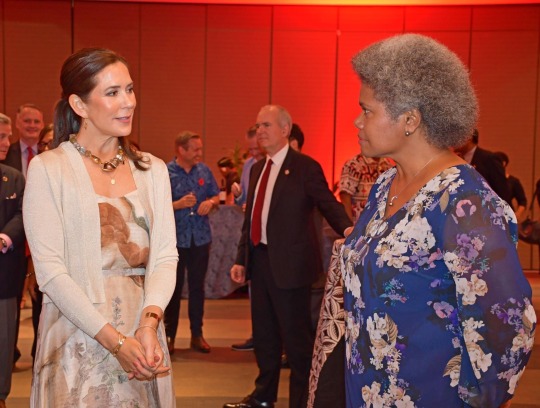



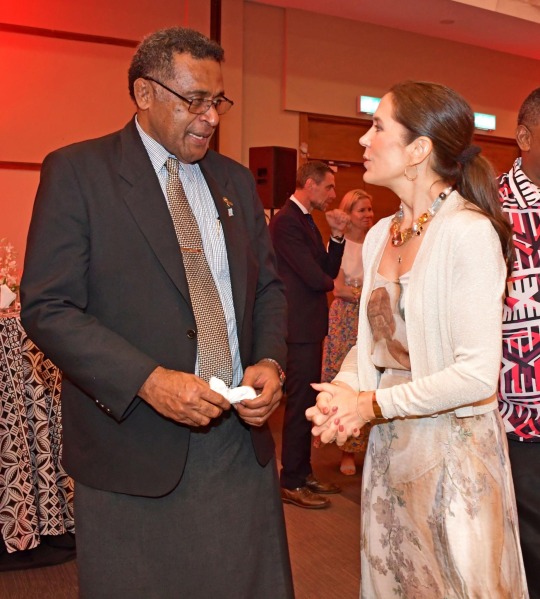

🇩🇰 Crown Princess Mary of Denmark
Tuesday, April 25, 2023
“Her Royal Highness, the Crown Princess of Denmark, Mary Elizabeth and the UNFPA Executive Director, Dr. Natalia Kanem were hosted to a welcome reception at the Grand Pacific Hotel in Suva this evening.
Crown Princess Mary took a daytrip to Nabavatu Village in Vanua Levu today where she had the opportunity to speak with villagers and saw firsthand the harmful impacts of climate change that some of Fiji’s rural communities are facing.
Addressing the reception this evening, Deputy Prime Minister, Hon. Manoa Kamikamica stated that the visit to the North by the Crown Princess was fitting because she was able to witness how climate change has forced people to relocate from their homes, and when relocation takes place, it is more than just a physical relocation because the extraction of a person from its central being and spiritual locality takes place.
DPM Kamikamica also highlighted that it is critical to be mindful of the impacts of climate change on women and the younger generation when relocation plans take place.”
25 notes
·
View notes
Text
Viral Post
I am happy to see that one of the news articles I posted is getting quite a lot of notes! It means the news is spreading about that particular issue, and awareness is key to initiating change.
Even though the loss of species in Fiji post has been met with a lot of criticism for being fake (although no one has ever argued an Independent.co.uk post form me before) as long as they share it, the news is spreading, so thank you (even though you probably aren’t even from my followers anyway).
The thing about that post is that I added my personal account from my time living on a remote island in Fiji off of Kadavu. Much time spent talking with the locals and spending plenty of my days drinking Kava with the Chief and elders of the village. If you want to argue climate change isn’t happening at an accelerated rate affecting these local communities, then go spend time with them yourself and then we can talk/argue about it. Until then, your typed messages behind a screen mean nothing.
And I am not arguing that climate change wouldn’t happen without humans. It would, and there is geological proof of that, but over the span of thousands-hundreds of thousands of years, not at the rate we are seeing today.
Thanks for listening and sharing. And to my true followers, never stop being awesome and working to help our oceans!
- Meg
#news#science#climate change#marine biology#marine conservation#fiji#human impact#environmental impact#criticism
17 notes
·
View notes
Quote
Climate change is not a hoax. it is frighteningly real. Billions of people are losing the ability to feed themselves. Don’t let the whole side down by leaving, just when we have a game plan.
Frank Bainimarama, the prime minister of Fiji, speaking at a conference in Melbourne. Learn more.
#frank bainimarama#fiji#fiji islands#fijian#climate refugees#climate change#climate impacts#climate#climate science#climate truth#climate reality#climate hoax#hoax#climatemarch#environment#global warming#rising seas#extreme weather#donald trump#paris agreement#climate agreement#climate denial#climate denier#climate change denial#climate skeptic#climate change denier#steve bannon#scott pruitt#epa#clean power plan
353 notes
·
View notes
Text
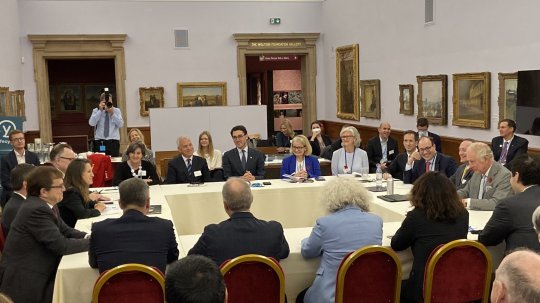





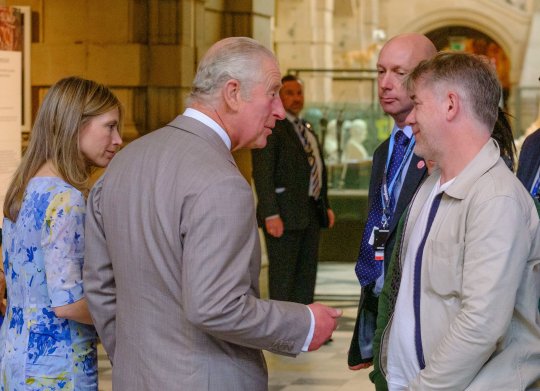
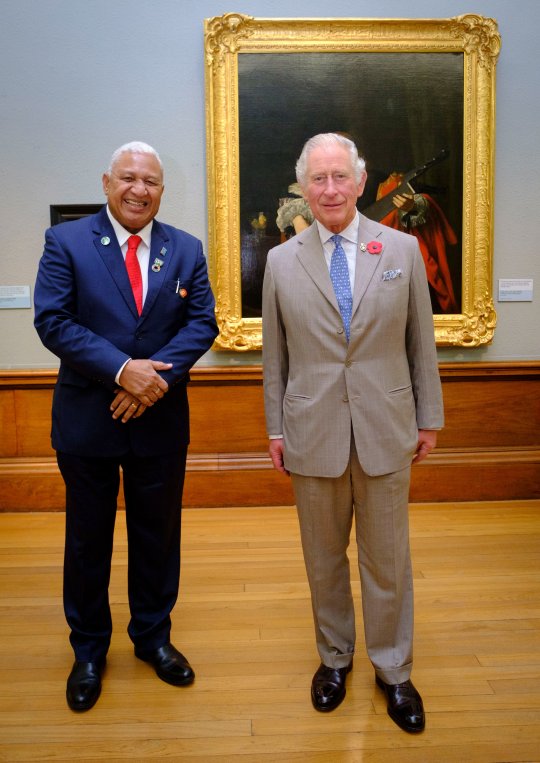
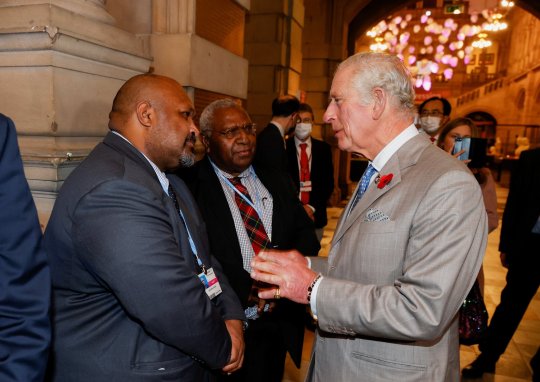

November 4, 2021
The Prince of Wales is still in Glasgow taking part in events at COP 26. Today he met with Indigenous people to talk about climate change and the impact of the problem to indigenous people. Next he visited the SMI Terra Carta Design Lab, which highlights the need for collaboration of art, science, design, and engineering. He also met with Brazilian and Ugandan climate activists, the Prime Minister of Fiji, and held a roundtable with Canadian Private Companies about climate action. In the evening he hosted a reception for chief negotiators of COP
4 notes
·
View notes
Text
How humans brought change to a tropical paradise
https://sciencespies.com/nature/how-humans-brought-change-to-a-tropical-paradise/
How humans brought change to a tropical paradise
After centuries of human impact on the world’s ecosystems, a new study from Flinders University details an example of how a common native bee species has flourished since the very first land clearances by humans on Fiji.
In a new paper in Molecular Ecology, research led by Flinders University explores a link between the expansion of Homalictus fijiensis, a common bee in the lowlands of Fiji, which has increased its spread on the main island Viti Levu alongside advancing land clearance and the introduction of new plants and weeds to the environment.
“Earlier research connected the relatively recent population expansion to warming climates, but our study reveals an interesting and positive response from an endemic species to human modifications to the landscape which commenced about 1000BC,” says lead author, Flinders University researcher James Dorey.
“This species is a super-generalist pollinator (pollinates many plant species) and likes to nest in open, cleared ground, so one of the most important bee pollinators in Fiji actually appears to have benefited from human arrival and subsequent clearing of land in Fiji.”
The study examined changes in native bee populations in Fiji using phylogenetic analyses of mitochondrial and genomic DNA. They show that bee populations in Fiji expanded enormously, starting about 3000 years ago and accelerating from about 2000 years ago.
Compared to the main island, Mr Dorey says no corresponding change in bee population size was found for another major island, Kadavu, where human populations and agricultural activities have been historically very low.
advertisement
“That is too recent to be explained by a warming climate since the last glacial maximum which ended about 18,000 thousand years ago,” says senior author Associate Professor Michael Schwarz in the new paper.
“Instead, we argue that the expansion of Fijian bee population better coincides with the early occupation of the Pacific islands by the somewhat-mysterious Lapita people, and this expansion accelerated with increasing presence of later Polynesians in Fiji who modified the landscape with their agricultural practices.”
The research is an example of how the impacts of early human dispersals can be inferred even when fossil records are not available and when climate change is a complicating factor.
One possible downside of super-generalist pollinators, such as the endemic Fijian halictine bee Homalictus fijiensis, is that they could encourage the expansion of introduced weeds and exotic crop species — exacerbating other ecosystem changes in the long run.
“As well, those research techniques could be applied to many other animal species. For example, changes in population sizes of mammals, such as kangaroos, wombats and koalas, could be explored by looking at their tick and lice parasites which might have better ‘genetic signals’ of how populations have fared over the last few thousands of years or more, adds Associate Professor Schwarz, who says high-resolution population genetic studies such as this are a good way to discriminate between older and ‘natural’ events due to climate change and those resulting from early human dispersal and colonisation.
advertisement
“A persistent question in studies of ecosystems over the last 60,000 years or so concerns the relative roles of climate change and human modifications of the environment. For example, there is a continuing debate about the extinction of megafauna in Australia — was it due to humans, climate change, or both?
“Those kinds of question can be addressed if there are very good fossil records, but what about ecosystems where fossil records are very poor.”
The new paper is a result of almost a decade of scientific studies into Fiji’s biodiversity by SA Museum and Flinders University biological scientists and students.
SA Museum’s research fellow in World Cultures, Dr Stephen Zagala (pictured attached), says the new study gives fascinating insights into how current ecosystems were assembled during the various phases of human migration and settlement.
“Early European explorers and naturalists were unaware that extensive human dispersals had already been transforming the ecologies of Pacific islands for millennia,” he says. “This study adds important details to an emerging picture of the Pacific as a highly cultivated landscape.”
#Nature
2 notes
·
View notes